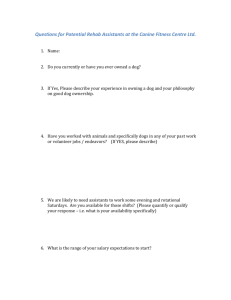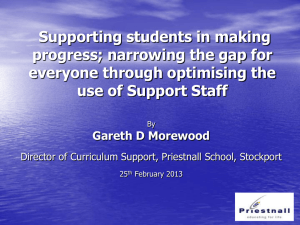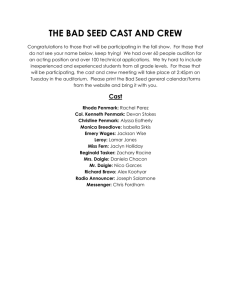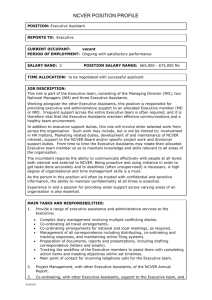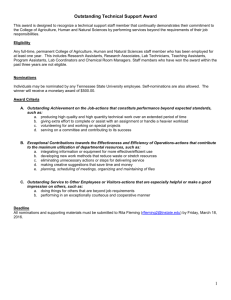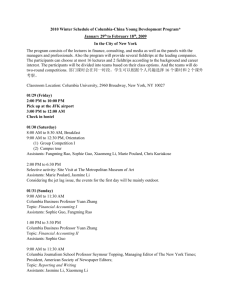Media Analysis (24-03-14)
advertisement
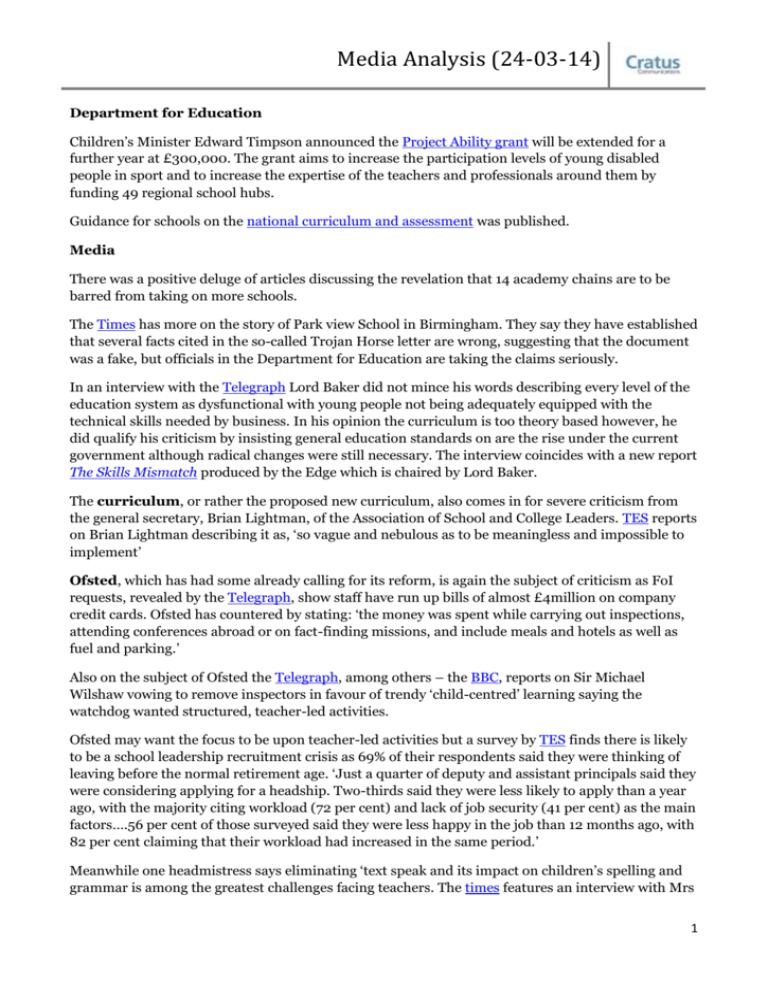
Media Analysis (24-03-14) Department for Education Children’s Minister Edward Timpson announced the Project Ability grant will be extended for a further year at £300,000. The grant aims to increase the participation levels of young disabled people in sport and to increase the expertise of the teachers and professionals around them by funding 49 regional school hubs. Guidance for schools on the national curriculum and assessment was published. Media There was a positive deluge of articles discussing the revelation that 14 academy chains are to be barred from taking on more schools. The Times has more on the story of Park view School in Birmingham. They say they have established that several facts cited in the so-called Trojan Horse letter are wrong, suggesting that the document was a fake, but officials in the Department for Education are taking the claims seriously. In an interview with the Telegraph Lord Baker did not mince his words describing every level of the education system as dysfunctional with young people not being adequately equipped with the technical skills needed by business. In his opinion the curriculum is too theory based however, he did qualify his criticism by insisting general education standards on are the rise under the current government although radical changes were still necessary. The interview coincides with a new report The Skills Mismatch produced by the Edge which is chaired by Lord Baker. The curriculum, or rather the proposed new curriculum, also comes in for severe criticism from the general secretary, Brian Lightman, of the Association of School and College Leaders. TES reports on Brian Lightman describing it as, ‘so vague and nebulous as to be meaningless and impossible to implement’ Ofsted, which has had some already calling for its reform, is again the subject of criticism as FoI requests, revealed by the Telegraph, show staff have run up bills of almost £4million on company credit cards. Ofsted has countered by stating: ‘the money was spent while carrying out inspections, attending conferences abroad or on fact-finding missions, and include meals and hotels as well as fuel and parking.’ Also on the subject of Ofsted the Telegraph, among others – the BBC, reports on Sir Michael Wilshaw vowing to remove inspectors in favour of trendy ‘child-centred’ learning saying the watchdog wanted structured, teacher-led activities. Ofsted may want the focus to be upon teacher-led activities but a survey by TES finds there is likely to be a school leadership recruitment crisis as 69% of their respondents said they were thinking of leaving before the normal retirement age. ‘Just a quarter of deputy and assistant principals said they were considering applying for a headship. Two-thirds said they were less likely to apply than a year ago, with the majority citing workload (72 per cent) and lack of job security (41 per cent) as the main factors….56 per cent of those surveyed said they were less happy in the job than 12 months ago, with 82 per cent claiming that their workload had increased in the same period.’ Meanwhile one headmistress says eliminating ‘text speak and its impact on children’s spelling and grammar is among the greatest challenges facing teachers. The times features an interview with Mrs 1 Media Analysis (24-03-14) Jordan who criticises government plans for a core maths qualification for all sixth formers saying there should be a drive to stop the damaging effect of instant messaging on written English work. Continuing on from last week’s news regarding school places the BBC has an article on Reading council taking out a private loan in order to fund expansion of its schools. ‘In addition to £19m from the government, Reading Borough Council has had to borrow £34.5m, which will cost the authority £2.5m per year.’ Parliament On the 18th March Alex Cunningham, Labour, Stockton North, secured a debate on teaching assistants. The key points arising from this debate: Lindsay Roy (Glenrothes) (Lab): Teaching assistants are an invaluable asset to youngsters on the autistic spectrum. What would be the likely impact in classrooms of a diminution in the number of people who are involved in that role and of those involved in their training and development? There was criticism of the findings published by Reform, they were deemed to be very selective in terms of the evidence used in support of their conclusions and aimed to generate scaremongering headlines rather than address the real issues. Alex Cunningham: ‘We need serious action to confirm and codify the role of teaching assistants in our education system and the functions that they can rightly be expected to undertake, not to mention the remuneration that they can fairly expect, to ensure that their contributions are fully recognised.’ Value of continuous professional development. Lack of a national framework for pay and job evaluation means that academies are frequently hiring teaching assistants on lower grades than are appropriate, depressing pay and assigning duties to teaching assistants that are outside their job descriptions. Elizabeth Truss: I want to address a misconception about the future of teaching assistants and the claims that many will lose their jobs. I absolutely assure the hon. Member for Stockton North and his colleagues that neither the Department for Education nor the Government have any plans or powers to make that happen. Our intention is to make the evidence of good practice, supported by case studies, available to schools this year. When I speak to head teachers, they tell me that staff are motivated by a variety of things— partly the remuneration package, but also such things as the career structure, training opportunities and the atmosphere in a school. All those things contribute to a good package and it is up to school leaders who want to retain and recruit the best people to offer an attractive package to encourage people to join or stay part of their school. Reforms will ensure that there is a greater focus on outcomes rather than on the hours of provision in agreeing the teaching and support to be provided for pupils with SEN, giving families and young people a greater say. We have also established a national scholarship fund for support staff, helping them to develop expertise and higher level skills. Ultimately Truss’s closing remarks demonstrated the key difference between the official Labour and Conservative lines on education. The Conservatives believe schools should have autonomy over decisions on staff while being held to account through inspections. Hence, ‘we are reluctant 2 Media Analysis (24-03-14) to dictate to schools how to deploy teaching assistants or impose rigid boundaries about what teaching assistants can and cannot do.’ 3
